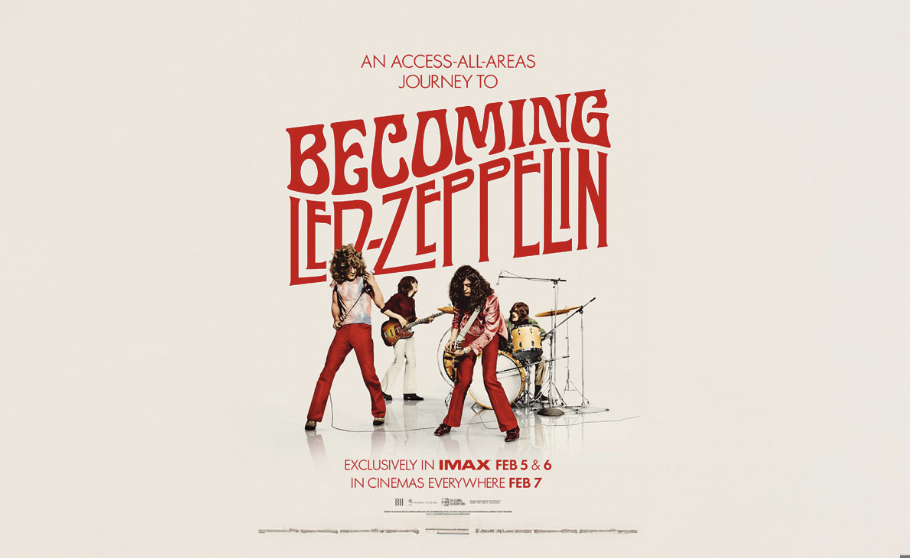Like John Bonham’s drumming, ‘Becoming Led Zeppelin’ was a burst of energy on release for all classic rock addicts. Premiering on 7 February 2025, the documentary follows the formation of one of the greatest rock bands of all time. The film highlights the upbringing and journey of band members Jimmy Page, Robert Plant, John Bonham, and John Paul Jones. Throughout members’ childhoods, to a climax in 1970, the documentary brings to light how Led Zeppelin’s first two albums were created and their explosion of popularity. After the band split in 1980, the film, directed by Bernard MacMahon, is the first documentary created in cooperation with band members. While not flawless, ‘Becoming Led Zeppelin’ successfully showcases an authentic and electric portrayal of the band’s rise to global stardom.
Contextually, the last decade’s film trend has been music biopics, whether that be Queen’s ‘Bohemian Rhapsody’, Elton John’s ‘Rocket Man’, Bob Dylan’s ‘A Complete Unknown’ and over 45 more since 2015. ‘Becoming Led Zeppelin’ is a fresh return of an authentic music-based documentary. The film’s structure is simple and chronological, starting with the early 1950s, building to a 1970 climax at the band’s Royal Albert Hall concert. The ‘docu-concert’ style, layered with archival footage and present-day interviews from band members, builds an authentic voice and feel of the experiences and upbringing of the group. The footage, music, plot selection, and connection of living members have made this a culturally significant film for rock fans.
‘Becoming Led Zeppelin’ has many strengths as a documentary, including extensive archival footage, an engaging and authentic narrative, and great overall audio and visual selection. These aspects help create a captivating and culturally significant film for Led Zeppelin fans. MacMahon’s choice to load the documentary with archival footage, much like Page plays the guitar, with depth, relevance and flare is a major strength. Archival footage effectively brings the audience back to the era and clearly highlights Led Zeppelin’s sound and upbringing. The concrete narrative conveying how members grew up, found each other, and created legendary music perfectly balances documentary facts and authenticity versus storytelling and engagement.‘docu-concert’ style is also used successfully, not overloading viewers with electric concert videos, but creating balance with archival backstage, home, and present time reflective interviews. This balance allowed a broad audience of Led Zeppelin die-hards, to your average film enjoyer, to build understanding while holding engagement. Rock culture in the United Kingdom and America during the 1960s was so effectively conveyed through audio and visual choice that audiences ranging from 15 to 80 years old are either filled with understanding or nostalgia.
A section highlighting the combination of all these elements is where Led Zeppelin performs ‘Whole Lotta Love’ for a French television show, ‘Tous en Scene’. The archival footage of the performance, interviews with band members, and audience reactions are exceptional. It so clearly highlights the band’s feel, sounds, and culture of the time while displaying an extremely captivating musical ability. The balance of the present-day interview with Robert Plant is shown around archival footage, further creating authenticity, adding narrative and explanation. In short, the documentary holds engagement while being informative very successfully.
Although filled with positives, the documentary had some limitations, highlighting that not everything can be like Jones’ bass lines. Although the film’s main objective was the band’s formation, only focusing on the first two albums limited the scope. As a part of the narrative structure in the ‘return’ phase, a brief mention of where the band went after could have been effective. Pacing was also a factor, with many critics commenting on a lack of balance from a slow start to rushing over the 2nd album’s creation in 1969. However, with an audience Rotten Tomato score of 95%, limitations like these are small compared to the rest of the electric documentary.
When comparing ‘Becoming Led Zeppelin’ to other ‘docu-concerts’ of late, including The Rolling Stones ‘Gimme Shelter’ and The Beatles ‘Get Back’, it’s in a league of its own. The level of research done by MacMahon and his team, going into intricate detail, makes it a standout, highlighting its authenticity. The never-before-heard John Bonham interview after his passing in 1980 was found while researching for the documentary. Critics have praised the interview as the documentary’s best feature and wouldn’t have been possible without the immense research. Comparatively, due to its authenticity, ‘Becoming Led Zeppelin’ is superior to ‘docu-concerts’ and music biopics reminiscent of their music. All leading to ‘Becoming Led Zeppelin’ grossing over 13 million dollars at the box office.
To conclude, ‘Becoming Led Zeppelin’ is a documentary that effectively highlights an authentic yet engaging look into the rise and fame of one of the world’s greatest bands, Led Zeppelin. Through an immense level of research, the selection of archival footage and present-day interviews creates a significant and worthwhile film that can be loved by both ‘Zepheads’ and film enthusiasts. This is one of, if not the best, music-based documentaries of all time, just like Led Zeppelin’s music.
